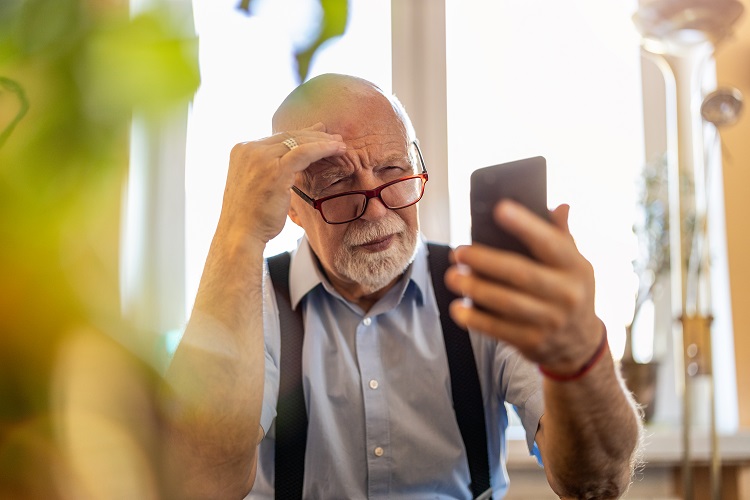 Source: iStock.com/PIKSEL
Source: iStock.com/PIKSEL
Senior citizens and modern technology: Is digital literacy lacking?
19. July 2021 Published by Raphael DoerrA piece of news that may be bewildering at first: More than half of all Germans aged 65 and above don’t use a smartphone. That’s the conclusion of a representative study by the “Digital for All” initiative recently published by the German digital association Bitkom. The survey reveals that 53 percent of respondents over the age of 65 don’t own a smartphone. That begs the question: Why? Do the elderly prefer senior citizen cell phones or do they simply not want to be “always on” and enjoy the advantages of the new digital normality?
One advantage of not using a smartphone is that you don’t have to undergo a digital detox and learn that there’s also life without one. Yet, as in all surveys and studies, things are put into perspective when you dig deeper into the numbers. Only 36 percent of those aged 65 to 74 don’t use a smartphone. By way of comparison: Just 21 percent of the entire population said they didn’t use one – either in private or at work. However, other devices and technologies don’t play a big part in the older generation’s everyday life, either. Only half of seniors use a laptop (53 percent) or a desktop PC (50 percent), while barely 9 percent own a smart watch.
Of course, the study raises a few questions. Are Germany’s senior citizens “stick-in-the-muds” when it comes to technology, smartphone deniers or even digitalization refuseniks? Or have smartphones and all the related apps and digital technologies become too complicated to understand and use in everyday life? We try to get to the nub of the matter and look at a few important aspects in more detail in this blog post.
Let’s start with digital technologies and the digital competence needed for them. But what does digital competence actually mean and what exactly do we understand by it? “Digital competence denotes the ability to come to terms with and actively shape the digitized world.” In the view of the health insurer Techniker Krankenkasse, well-developed digital competence comprises many different pieces of a jigsaw. “They help people move in the digital arena confidently and effortlessly. Users are digitally competent if they are able to use a digital program or aid.” That’s doable and, of course, many seniors cope perfectly well with that in everyday life. However, there is still a certain skepticism about digital technologies. That’s revealed by two surveys commissioned by Bitkom. They were conducted in January and July 2020, each with more than 1,000 participants from Germany aged 65 and above. However, as the latest report from the Federal Ministry for Family Affairs, Senior Citizens, Women and Youth entitled “Older People and Digitization” shows, it’s not the technology itself that poses problems for the elderly, but rather using it.
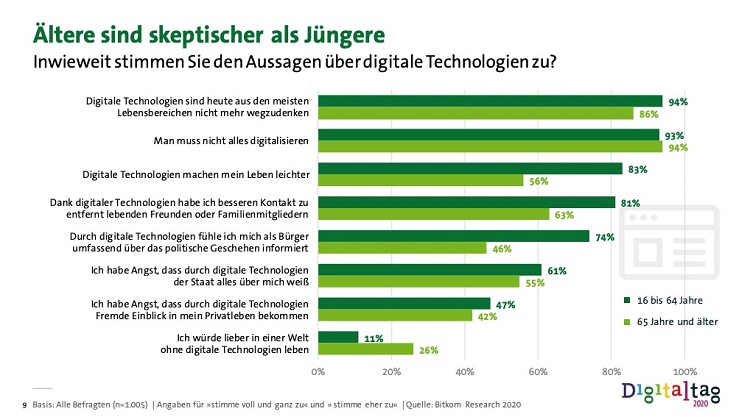
Dispelling preconceptions
4,600 people a day turn 65 in the U.S. The idea that this age group is averse to technology is a myth, according to Derek Holt, President and Chief Operating Officer of K4Connect, a company specializing in technology for seniors. “Seniors like technology. The functions they are interested in just differ.” However, they tend toward other types of devices than younger people. According to Pew Research, less than a quarter of all Americans owned a smart watch in 2019, for example. A recent study revealed that elderly Americans are interested in health data, but are not keen on wearables or smart watches because they believe these devices have not been developed with their needs in mind. Elderly Americans stated in the survey that, for example, they find it difficult to recognize the tiny icons and fonts that are mainly used on smart watches.
The picture is different when it comes to using voice technologies, such as Alexa, Siri and Co., for instance. Various studies show that in particular those aged 65 and above are very partial to digital aids like Alexa, Siri or Google Assistant. Seniors from California, for example, like to ask the time of day or for the weather, activate their favorite radio station to hear the news, and use them to be reminded about appointments or to take their pills, regulate the heating, switch the lights on or off, play music and communicate with family and friends using voice commands. Others use Alexa as a dictionary or to ask general knowledge questions.
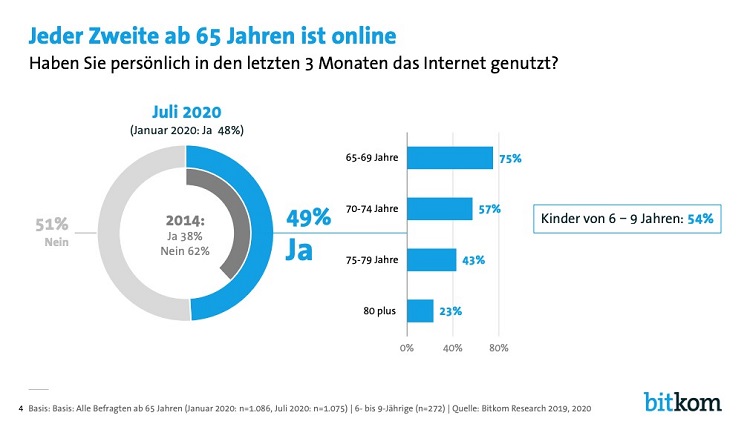
Senior citizens who already use the Internet prefer to write e-mails (96 percent), search for information about their interests (93 percent), read the news (88 percent) and order goods (72 percent) or use it for online banking (69 percent). In contrast, numerous seniors seem not to have a clue what Netflix, Instagram, Facebook, Spotify and Co. are. Just 44 percent stated in June that they watch series, films or videos online. 40 percent used video telephony and only 34 percent were interested in social networks. Use of a conventional PC is most widespread among seniors. 54 percent use a desktop computer, 42 percent a laptop and 20 percent a tablet. 41 percent also use a smartphone, whereas 25 percent still make do with a mobile phone that doesn’t have a touchscreen.
Digital competence for everyday digital life
“The coronavirus crisis has shown how important smartphones are in society – whether for contact tracing or registration in stores. Anyone without a smartphone is often marginalized,” warns Anna-Lena Hosenfeld, Managing Director of the “Digital for All” initiative. “The pandemic in particular has made digital technologies increasingly indispensable in many areas of life.” That’s a finding shared by many politicians and experts. There is no lack of offerings, as last year’s Germany-wide Digital Day showed. 27 organizations from civil society, culture, science, the business community and the public sector joined forces under the “Digital for All” initiative to advocate for more digital inclusion in more than 1,400 campaigns. These campaigns with their diverse formats shed light on the issue of digitalization from a wide range of different perspectives. But is a day of action enough to make the elderly generation more willing to engage with and accept digital technologies? Critics emphasize that there is still in many areas a piecemeal approach in Germany to the issue of developing digital competence, especially among seniors: Above and beyond individual initiatives, there’s often no consistent and so sustainable strategy. A look at Sweden shows how things can be done differently.
The Swedes also asked how the elderly could be familiarized better with using the online world. The idea: a TV program that gives them coaching in everyday digital life would be a sensible solution. And so Swedish television has a special program to impart knowledge to seniors and give them practical assistance in this sphere. It’s called “Senior Surfers” and if, for example, you don’t know what an app is or where to search for it, this format provides the answers to your questions. Explaining and conveying digital know-how to seniors in a simple way is growing in importance in Sweden, since cash has almost died out there – people pay mostly by smartphone and BankID app. It’s used to identify yourself for all possible digital services: from the school app to the healthcare app. If you can’t log into it, you’re as good as left out in the cold. Parking machines have also been replaced by apps in many places, and if you want to go shopping or to the restaurant, you need an app just like here in Germany. Sweden is a sign of things to come – for Germany, too: Life is becoming more and more digital and you can’t do much without a smartphone and apps – whether for banking, coronavirus testing and vaccination appointments, shopping, or going out for a meal or to the theater. And the smartphone will become even more important in the future – once the digital vaccine certificate comes. If you’re elderly and haven’t an idea about or don’t use the digital possibilities, you’ll find it tough. What is practical and normal for the young is often an obstacle for the older generation.
There is no such TV program here in Germany, but we do have the Digital Compass with its free offerings for seniors on matters relating to the Internet. At 100 locations nationwide, volunteer Internet guides help elderly people try out digital offerings. The offering is used, but – unlike in Sweden – is nowhere near to reaching all senior surfers. Nevertheless, the majority of seniors see digitization not as a threat, but as an opportunity, as the chart shows. And they’re not alone with that view: The DIVSI U25 study shows that young people are increasingly skeptical about living in a world that is shaped only by digital services and the possibilities offered by online communication. That clearly illustrates that digital competence is also defined by critical use of media or refusal to use them.
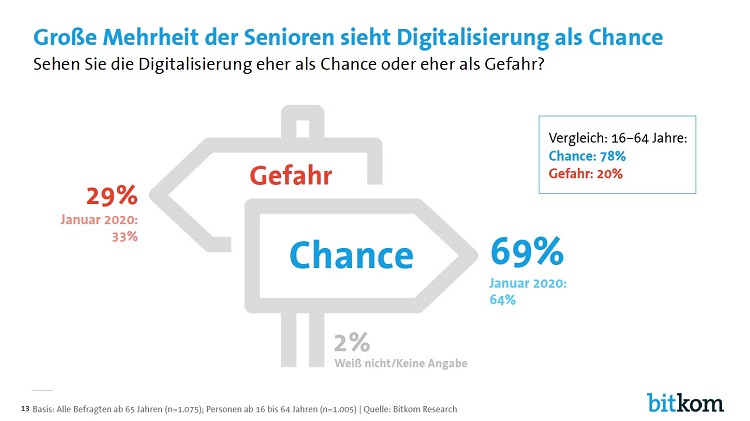
According to a survey by the German information and telecommunications industry association Bitkom from last fall, almost 70% of elderly people regard the Internet “as an opportunity.” However, only every one-in-two senior citizens aged 65 and above actually uses the Internet. “Even though the Internet has hardly won over extra fans among the elderly: Once you start moving in the digital world, you won’t want to do without it,” stresses Bitkom President Achim Berg in commenting the study’s results. Six-out-of-ten elderly Internet users (62 percent) can no longer imagine life without the Internet. And almost all (94 percent) have been able to expand their knowledge thanks to it. Three-out-of-four (76 percent) say the Internet helps them keep mentally fit. And there’s also a figure that should make us sit up and take notice: Almost every one-in-three online shoppers last year was older than 60, according to a consumer study by the German E-Commerce and Mail Order Association (bevh).
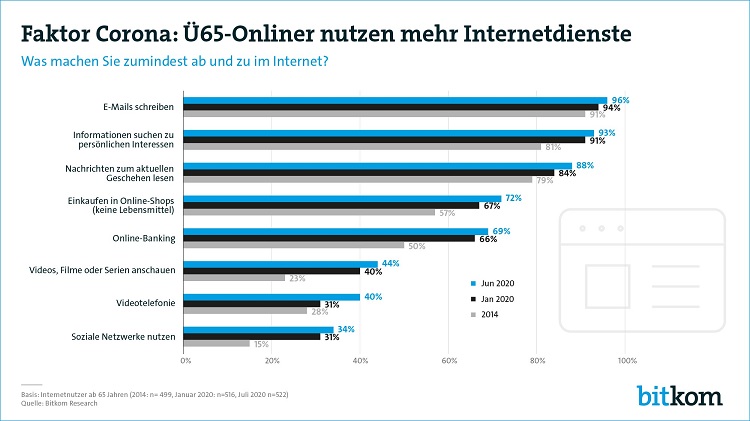
The smartphone is still at hand
Above all, the smartphone is a constant companion to many seniors, even though – as noted at the outset – the latest survey numbers from Bitkom don’t suggest that. Four-out-of-ten people above the age of 65 use one. In contrast, cell phones for senior citizens with extra-large buttons have turned out to be shelfwarmers. That’s no surprise. After all, there is the saying “it’s not important how old you’re, but how you are old” – and very few seniors want to give the appearance of being old-fashioned.
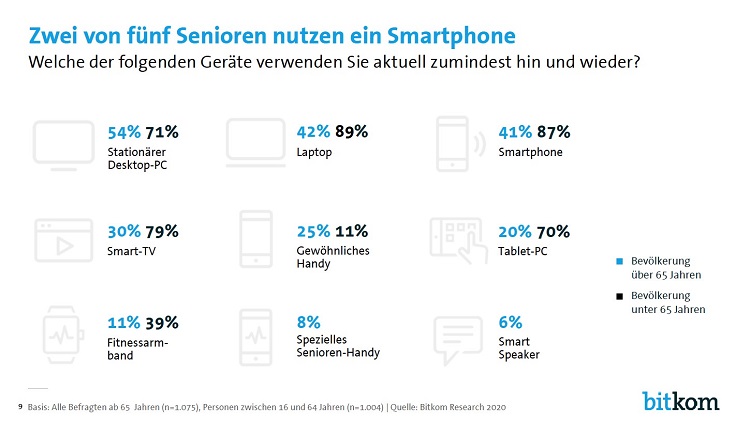
The grandkids decide
When the old mobile phone gives up the ghost, it’s often the grandkids who decide what grandma and grandpa need and what’s important when it comes to a smartphone. After all, they’re familiar with the technology. But what’s most underestimated: Unlike the grandchildren, who have grown up with smartphones and have them in their hand all the time, older people and senior citizens have other needs and are not so enthusiastic about online streaming, online series or social media. The Apple Watch is an example of that: It comes with an unbeatable range of medical and security functions, such as fall detection, emergency SOS or heart monitoring, and just about anything can be measured with it. And although that makes Apple Watch very suitable for seniors, there is not much demand for it among this target group. We briefly described the reasons for that earlier. Manufacturers, guides and purchase recommendations for newcomers repeatedly emphasize how important it is for the elderly for the devices to be easy to use and have a clearly legible display – but all smartphones boast that now.
Anyone buying a special cell phone for senior citizens attaches importance to easy pf use and clear functions. The German magazine Stern writes that “senior citizen smartphones are distinguished by large buttons, ease of use, well-structured menu navigation and various additional features, such as the SOS button or hearing aid compatibility. The cell phones for seniors are popular among the older generation because they are an aid if you have poor eyesight or are hard of hearing.” In particular in old age, it’s important to be able to be reached and keep in contact with family or friends when you’re out and about.
So far so good. All these points are correct and known, and all manufacturers have also acknowledged and addressed them by and large in the various models they offer. However, a more important aspect is not to leave grandma and grandpa to fend for themselves after they’ve bought a smartphone, but for them to keep on practicing how to use it and, in particular, the important apps. Just like you have to do when surfing. The German newspaper FAZ puts it in a nutshell: “Surfing is one of the world’s toughest sports. You need a lot of patience before you’ve attuned your body and mind to the unforeseeable rhythmic movement of the waves so that you can ride them safely. Sometimes it takes all your life long to learn the right technique. ‘Silver surfers’ is a term used in coastal regions of America for elderly women and men who find it difficult to get out of their car, but exude awesome calm as soon as they stand on their surfboard and ride calmly into the barrels, the tube-like hollow part formed by a breaking wave, as if they were entering an empty alpine tunnel.” In marketing jargon and advertising, “silver surfers” is often used to denote prime specimens of hesitant Internet users and is associated with attributes such as incompetence and uncertainty. “Only one-in-three of those surveyed above the age of 70 says they feel confident and in control when surfing in the web. It seems that most of the decried “silver surfers” are usually dragged down into the depths of the web by the waves that engulf them with every click and gasp desperately for air there.”
It’s high time to revise this picture and take seniors with their digital needs and expectations seriously. It’s not just the grandkids who need to show the older generation why smartphones are becoming more and more important, what apps can now do and where they’re required in everyday life. That starts, for example, with a digital tour together through the grandparents’ district – that will doubtless offer enough chances to demonstrate the benefits of smartphones to them and not just explain them in theory with reference to the operating instructions. There are sufficient possibilities and offerings, such as the “Wegweiser durch die digitale Welt” (“Guide through the Digital World”; German only) for the elderly from BAGSO, the German National Association of Senior Citizens’ Organizations. They should be used and practiced rigorously and systematically, otherwise it will be difficult to achieve digital competence and inclusion and to lead a self-determined digital life.
 Comments
Comments
 en
en 







